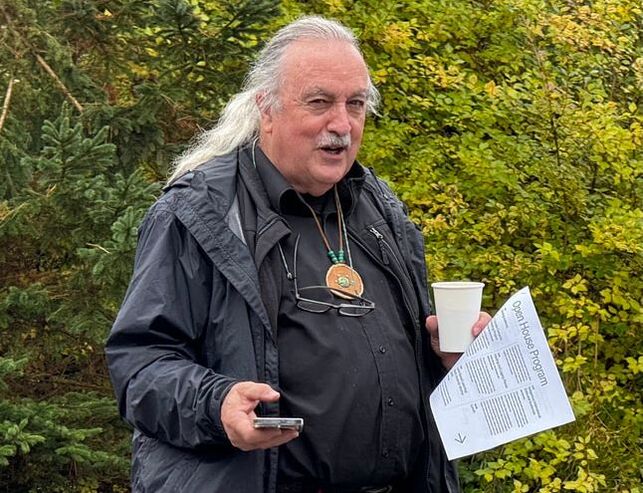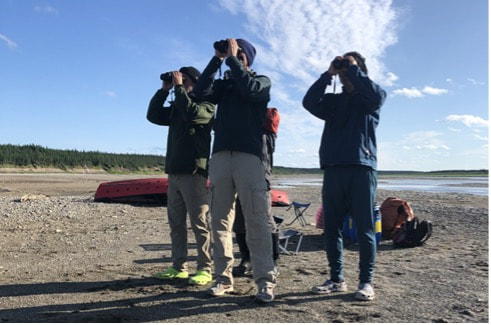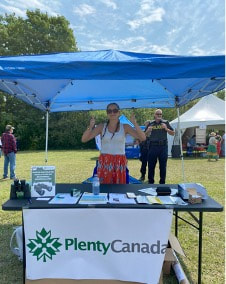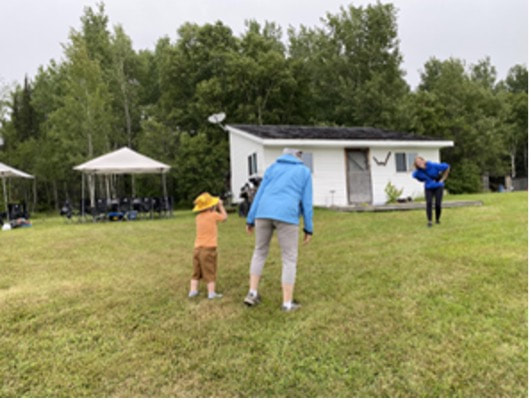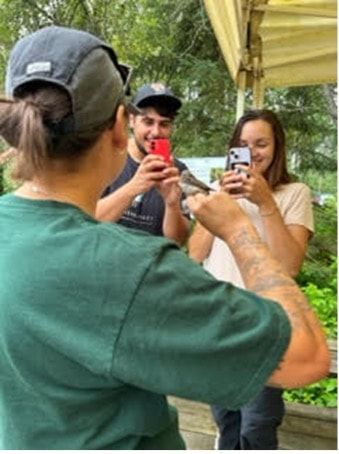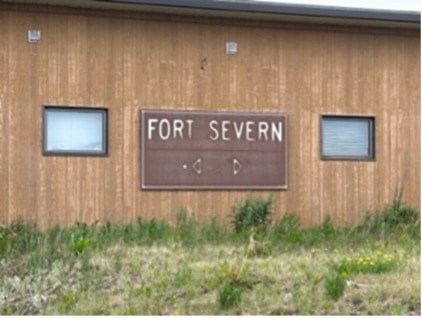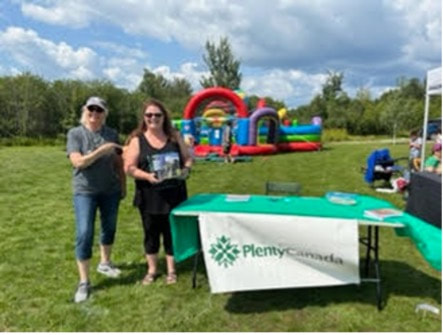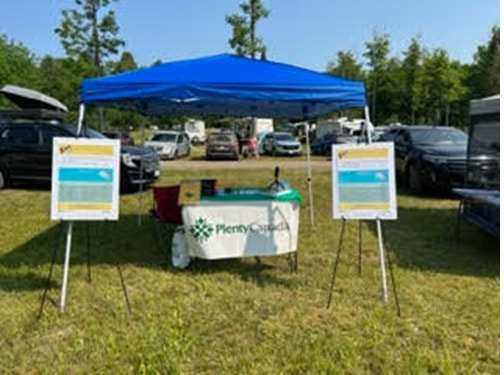 Dear Friends, I'm incredibly pleased and humbled by the success of our recent Open House, celebrating the official unveiling of the Plenty Canada CampUs. It was a wonderful day of celebration, good conversation, and reflection on our collective responsibility towards Indigenous peoples, truth and reconciliation, the environment, and ourselves. If you were there, thank you very much for coming out! And if you weren't, no problem. I'd still like to thank you for keeping up with the development of the CampUs, from its conception to completion. Your support means the world, wherever you happen to be! The more I reflect upon the events of the past few weeks, the more excited I am for the future of our organization. Not only do I firmly believe that the CampUs has a bright future ahead of it as a physical legacy and meeting space, a place for people of all backgrounds to congregate, but I also believe that it can act as a standing representation of our deeply held values. As stated in some of our past communications, Plenty Canada is striving to further decrease our carbon output, rendering our organization even more Energy Negative than it already was! True to our mandate, the CampUs was built in its entirety with sustainability in mind: siding and roofing to prevent air leakage, a rainwater collection system, an Energy Recovery Ventilator (ERV), and more. We've installed solar panels on the roof of our second Lanark building and our Six Nations Bureau office is also adding a new solar system that will have capacity to charge an electric car! But despite our recent advances, I'd like to remind you all (and myself) that these values we cherish should not be optional. As the leader of an Indigenous organization, I feel that this commitment, this unshakable mandate, is a responsibility we must carry with us. The principle of Two-Eyed Seeing, fusing an Indigenous perspective on the environment with the best of Western science, simply cannot remain theoretical, not when our collective future is at stake. Thus, we will continue to embody our values in everything we do, until our entire country chooses to embody them as well. As a result, we challenge all of our partners, organizations and individuals, to plan and resource your own energy neutral existence. Chi Miigwech. Niá:wen. Merci. Thank you. Larry McDermott, Executive Director, Plenty Canada
0 Comments
Plenty Canada had been anticipating its October 21st Open House for many months, finishing up renovations and advertising the event numerous times on its various social media channels. Given the importance of the CampUs when it comes to Plenty Canada’s future as a carbon negative organization, it was critically important that the Open House went off without a hitch. First impressions are important, after all, and the organization wanted to ensure the public that the new space would be ready for any possible set of activities.
For almost 40 years, Plenty Canada’s office has served as an important gathering place for cross-cultural work. Over the past two years this remote rural headquarters has been transformed into a site that features significant solar energy generation, environmentally sustainable windows and siding, new sustainable heating and water systems, newly furnished rooms for classes and lodgings, and much more. Luckily, the event was a smashing success! The overcast, slightly chilly weather didn't deter the numerous attendees one bit. The attendees weren't just from the local area either. Some travelled hours to visit the Open House, including representatives from the Bruce Trail Conservancy, the Niagara Escarpment Biosphere Network, and our Six Nations office in Southern Ontario. Gathering under a large tent that was rented for the occasion, everyone came together for a series of wonderful presentations from experienced elders and educators, in between opportunities to tour the transformed CampUs buildings. Programming ran from 9:30 in the morning with an opening address from Executive Director Larry McDermott, to 3:30 in the afternoon with a follow-up talk by Larry on the future of the CampUs. It is difficult to pick a single highlight among all the fascinating presentations. As previously mentioned, Tim Johnson and Amanda Harwood came up from Plenty Canada's Six Nations Bureau and provided a fantastic update on the Great Niagara Escarpment Indigenous Cultural Map. The visitors were also treated to a talk from celebrated Cuban Indigenous educator and long-time Plenty Canada collaboratorJose Barreiro, on Plenty Canada's Maya-Guatemala project, which empowers Indigenous women in the region to preserve their ancestral knowledge and values. Of great interest, of course, was Plenty Canada's CampUs reveal that took place immediately following the opening address, along with the announcement that the new building was officially certified Net Zero just a few days before the event. In fact, the organization as a whole is now Energy Negative! In a program entitled Carbon Negative: The Sun Is Our Sources, recent testing has revealed that Plenty Canada nailed its net zero qualifying numbers, with a reduction from 9 to .75 (a lower number indicates a greater degree of air tightness). With the addition of 72 more solar panels the goal is to inspire other organizations and individuals to do their part to mitigate climate change while demonstrating to other not-for-profits, businesses, and even individuals, that achieving carbon neutrality or even negative carbon status is possible. Other programs focused on Healing and Legacy Places, Land-Based Learning, Youth Programming, Community Based Governance of the Niagara Escarpment Biosphere Network, Indigenous Perspectives on United Nations Sustainable Development Goals, Language Preservation, and Two Eyed Seeing To Share Knowledge of Ontario’s Breeding Birds. Visitors were given the chance to tour through all of the rooms within each building. From the new accessible stairway and beautiful cobblestone walkway outside, to the sustainable energy systems and multiple rooms renovated for educational programs, offices, and lodging inside, pretty much everything about the buildings was brand new for most every visitor. The integrated design of the interior and exterior programming spaces was beautiful. Overall, it seems that the new CampUs was a big hit! Those involved in the process are extremely grateful for the positive reception to the unveiling of the CampUs. Every single compliment meant the world to members of the staff; the organization will work hard to make sure that upcoming programming at the Plenty Canada CampUs lives up to the early hype. You won't have to wait long for news on new programming. With energy from the sun and water supplied by nature the complex has been activated. — Breton Campbell and Tim Johnson Weaving family love, fostering abundance, and promoting unity are fundamental pillars for improving the living conditions of Q'eqchi communities in Guatemala. In this endeavor, we value ancestral knowledge and the importance of unity as key elements for progress and the recovery of our people. One of the first steps is access to clean water, a crucial priority on this path to well-being. By ensuring a sufficient water supply, we free up time spent searching for it, allowing us to dedicate it to tending gardens and developing handicrafts, which represent a significant source of income for Q'eqchi women. Combating diseases caused by the consumption of contaminated water becomes a significant step in improving the quality of life and health in our community. Malnutrition, a concerning issue for our families, can be addressed through water harvesting, enabling the production of fresh and healthy foods to nourish our loved ones. With water as a fundamental resource, we forge a more promising future for generations to come. Also, proper waste management is crucial in these steps towards improving the quality of life for the beneficiaries, as many families currently have septic tanks that lead to illnesses and pose short and long-term environmental contamination to Mother Earth. Weaving family love, producing abundance, and maintaining unity are the foundations upon which we build a path to a better future for our people. Through access to clean and safe water, better waste management and give the appropriate techniques we unlock the potential of our communities, empowering women and combating malnutrition. In ancestral knowledge and unity, we find the strength to confront current challenges and create a prosperous and harmonious future for all. Since the beginning of the Dignified Life project in early 2022, my understanding has grown regarding how to provide dignified conditions for Maya grandmothers from whom I have acquired significant knowledge about spirituality, customs, and ancestral traditions. This led me to initiate a project focused on improving the housing conditions of these wise grandmothers. However, along the way, I have encountered various paradigms and situations that money or economics can solve or resolve entirely. From my position as the director of such a loving and culturally rooted Maya ancestral project, I can act from my heart and initiative, which I consider a blessing and a gift from my ancestors. Challenges have grown, particularly in terms of encountering various social and community issues, lack of unity, undervaluation of support, and, above all, individualism within certain aspects of the communities. Revitalizing Maya Q'eqchi Indigenous Communities with a Sustainable Focus and Ancestral ValuesThe revitalization of Maya Q'eqchi Indigenous communities is a significant endeavor that seeks to blend modern techniques with the valuable ancestral values of our culture. This journey has been enriching and challenging, particularly in the realm of project management, requiring ongoing learning and time. After thorough diagnosis and deep immersion in our Maya communities, a substantive model has been established as a foundation for a comprehensive program. In 2023, we will apply this model with more certainty, hoping for even more positive outcomes. We have successful examples, innovative techniques, and a trained team, all supported by a robust plan that strengthens the social change we seek. Our organization's essence in community building, the willingness to collaborate and work together, just as our ancestors did with the ancestral principle of reciprocity. We encourage the revitalization of our customs and ancestral knowledge, recognizing that social change is achieved by embracing this concept and teaching it to the people in our communities. Reciprocity provides us with strength and promotes unity among us, fostering the motto "Today for you, tomorrow for me." We believe that by keeping the youth interested in these traditions and knowledge, we ensure the continuity and sustainable growth of our communities. Our goal is to work for three to five years in two communities, establishing them as exemplary models to inspire and support more Maya communities in the future. As a director, I commit to continuing my quest for technical and professional knowledge in areas such as Permaculture and Bioconstruction. This training will enable me to lead our sustainable community development efforts more efficiently and effectively, in harmony with nature and our ancestral traditions. In the first semester of 2023, we continued to monitor the constructions carried out in 2022, using methods of observation and ongoing training to ensure optimal results in the new techniques implemented for rainwater collection, water sanitation through filtration, and the management of both black and gray wastewater using filters called wetlands. Throughout this process, we have observed and confirmed the optimization of resources, the positive changes in the lives of the beneficiaries, and the successful outcomes of the installed systems. During this period in 2023, we executed two additional constructions as "pilot projects," employing techniques different from the previous ones. This allowed us to once again observe which techniques are the most effective and adaptable for the communities. Furthermore, we provided training and education to the construction team and the beneficiary families, promoting a significant shift in resource management. The beneficiary families of these projects reside in the Esperanza Chison community, located in the municipality of Carcha, Alta Verapaz, Guatemala. These families now have a proper system for rainwater collection, a water sanitation system, proper management of both black and gray wastewater, as well as bathroom and shower facilities connected to a filtration system.Additionally, construction was carried out using bio-architecture techniques. These projects have had a positive impact on the community, which consists of over 200 families. These families have shown genuine interest in learning these techniques and improving the conditions of their homes, as well as adopting effective waste management methods. Young individuals from the q'eqchi community have approached both projects with the aim of learning more about the filtration process for graywater sanitation, intending to implement these systems in their own homes. Thus far, the impact has been positive and has demonstrated that the communities have a strong desire to improve and develop in a clean environment, taking care of both their homes and their surroundings. This represents a significant step toward sustainable development, in which permaculture plays an essential role in the community improvement process. This report presents the results and progress achieved during the "Dignified Life: Revitalization of Maya Q'eqchi Indigenous Communities" project. Focused on improving living conditions and sustainable development in our communities, this project is based on ancestral values and the pursuit of unity as a means to achieve a prosperous and harmonious future for Mayan Qeqchies grandmothers and the new generations. Biodigester SystemIn our pilot project, we implemented a biodigester system, which is essentially a structure that allows controlled decomposition of organic matter, such as manure and food waste, in an oxygen-free environment. This is known as anaerobic digestion. At the core of our biodigester are microorganisms, especially methanogenic bacteria, responsible for breaking down these waste materials and producing biogas as a result. Our biodigester is a sustainable solution for organic waste management, preventing these wastes from becoming environmental pollutants. Instead of releasing greenhouse gases and unpleasant odors, we capture the decomposition gases in the biodigester and convert them into biogas. This biogas is a valuable source of renewable energy. We collect and store it for later use. The primary component of biogas is methane (CH4), which is a clean and efficient fuel. We utilize it in various ways in our community, such as an energy source for cooking, electricity generation, and, in some cases, as vehicle fuel. The biogas production process also carries significant environmental benefits. It helps reduce environmental pollution by capturing decomposition gases and converting them into a useful energy source. Additionally, it contributes to climate change mitigation by preventing the release of greenhouse gases into the atmosphere. In our project, we ensure the successful operation of the biodigester by maintaining optimal conditions for microorganisms. We control temperature, nutrient balance, and pH to ensure that microorganisms thrive in their ideal environment, working efficiently. One of the most rewarding aspects of this project is its community involvement. We train local people in the use and maintenance of the biodigester, enabling them to actively participate in the process and reap the benefits of biogas in their homes. Training and Valorization of Typical Maya Q'eqchi Weaving as a Source of Income for Maya WomenThe training project aimed at valorizing traditional Maya Q'eqchi weaving was carried out with the goal of preserving and promoting the cultural traditions of this Indigenous community while providing a sustainable source of income for Q'eqchi women. Below, we present the key results of this project. Training and Skill Development: A series of workshops and training sessions were conducted, covering traditional techniques of weaving, dyeing, and designing typical Q'eqchi textiles.During the project, the following results were achieved: Improvement in Weaving Skills: Participating Q'eqchi women demonstrated significant progress in their weaving skills. They learned new techniques and perfected traditional ones, enabling them to create higher-quality and aesthetically beautiful pieces. Knowledge of Natural Dyeing: Training was provided on natural dyeing techniques using local resources, allowing participants to create vibrant and unique colors in their textiles. Ancestral knowledge and unity within the Q'eqchi people constitute fundamental pillars for addressing current challenges and building a prosperous and harmonious future for all. These two elements are deeply rooted in our cultural and traditional identity, and their value is immense in the pursuit of sustainable and resilient solutions, passed down through generations over centuries, is an invaluable treasure for our community. It holds accumulated wisdom on the sustainable management of natural resources, appropriate practices for our environment, craftsmanship, and medicinal techniques, among other aspects. Rescuing and valuing this knowledge provides us with a significant advantage in seeking alternatives that promote prosperity and the preservation of our environment. Unity, on the other hand, provides us with collective strength to face the challenges that come our way. When we work together as a united community, we can overcome obstacles, share resources and knowledge, and confront adversities with greater resilience. Unity enables us to make consensus based decisions and develop collaborative projects that benefit everyone, thus reinforcing our social cohesion and solidarity. At the intersection of ancestral knowledge and unity, we find a powerful synergy. By recognizing and valuing the richness of our traditions and ancestral wisdom, we strengthen our sense of belonging and cultural self-esteem. This empowers us as a community, promoting respect and appreciation for our individual and collective identities. The wisdom accumulated over generations provides us with a solid foundation for addressing present challenges. We can find solutions tailored to our local context, harnessing our natural and cultural resources sustainably. At the same time, unity allows us to work together in implementing these solutions, sharing complementary skills and knowledge to comprehensively address the issues we face. In the process of building a prosperous and harmonious future for communities, the preservation and revitalization of ancestral knowledge and the promotion of unity are essential. By recognizing and respecting our cultural heritage, we empower ourselves to embrace innovation and adaptation without losing our identity. By working together as a cohesive community, we become stronger and more resilient in the face of the challenges we encounter, paving the way for a sustainable and equitable future for all members of our Q'eqchi community. Uplifting the spirits of customs and knowledge. Social change is reciprocity, a concept that needs to be re-taught to people because it gives us strength, and unity is born from it. "Today for you, tomorrow for me," and that is what gives us strength as a community. Keeping the youth engaged is essential. A three to five year effort to work in two communities, setting them as models for more Maya communities. Well-functioning project, to have people who are capable of working but lack this cultural and Indigenous awareness and responsibilityIn the four projects executed so far, my experience in constructing bioconstruction models for houses and bathrooms has shaped my thinking about bioconstruction. It involves the revaluation of ancestral construction methods, contact with Mother Nature, minimal to zero carbon footprint, and accessibility to housing improvements and living conditions. It is a construction method and branch that should be economically accessible. Regarding permaculture, it must be a core part of the project to ensure the sustainability of community development initiatives over time.
A Mayan community development project in harmony with nature doesn't require exorbitant amounts of money. It requires energy and effort and unity; sustainability doesn't have to be expensive. With natural resources, we can observe that it is careful project planning and discipline that can provide sustainability, eco-friendliness, and energy efficiency. Sustainability must be accessible to Maya communities. Therefore, along with the board members, we have decided to focus our action plan for the coming months in 2023 without changing our vision and mission, always fueled by our enthusiasm and dedication to each project. Initially, we believe it's essential to find and train a team that has a sense of cultural belonging, a desire to be part of this change in the human conditions of indigenous peoples, and the intention to train and make them a permanent part of the team. By building unity from within, we can create unity outwardly. The second mission during this upcoming period is to establish a collaborative trust network based on reciprocity with board members and community leaders (cocodes) in the two model communities where we have worked over the past three years. Once our trust network and activist team in Bioconstruction and Permaculture are established, we will continue to build more sanitary facilities, housing, and improve living conditions related to access to rainwater and energy. Project Fundamentals: Weaving Family Love, Fostering Abundance, and Promoting Unity: The project centers on three fundamental pillars: weaving family love, fostering abundance, and promoting unity. These ancestral values form the foundation of our communities and pave the way for a better future. Access to Clean Water and Sustainable Development: Access to clean water is a priority for the well-being of our communities. Liberating time spent searching for water allows a focus on productive activities like tending to gardens and engaging in artisanal work. Moreover, the fight against diseases resulting from contaminated water improves the quality of life and health. Combating Malnutrition and Improving Quality of Life: Access to clean water makes possible the production of fresh and healthy food, combating malnutrition and enhancing the nutrition of our families. Thus, water becomes the fundamental resource for forging a promising future. Importance of Ancestral Knowledge and Unity: Value of Ancestral Knowledge: Ancestral knowledge is an invaluable treasure passed down through generations. Rescuing and valuing this knowledge provides us with advantages in the search for sustainable solutions and harmonious development. Strength of Community Unity: Unity provides us with collective strength to face challenges. Working together enables us to overcome obstacles, share resources, and confront adversities with resilience, promoting social cohesion. Achievements and Challenges: Significant Achievements: We have established a substantial model for the project based on ancestral values and sustainabledevelopment. Four projects have been executed with positive results, demonstrating that it is possible to improve living conditions while respecting traditions. Faced Challenges: We have identified a lack of unity and limited appreciation for support within the communities. Bioconstruction and permaculture present challenges, such as excessive expenses and the need totrain experts in ancestral methods. Steps Towards a Promising Future: Revitalization Strategy: The strategy focuses on finding and forming a team with a sense of cultural belonging and awareness. Training in bioconstruction and permaculture is key to achieving lasting changes. Focusing on Awareness and Reciprocity: The project will concentrate on raising awareness about the importance of reciprocity and unity. This awareness will drive collaborative actions and strengthen the community from within. Prioritizing Unity and Loyalty: Establishing a collaborative network of trust with model communities is fundamental. Internal unity will enable projecting unity outward, creating an environment of trust and cooperation. Sustainable Construction and Permaculture: Emphasis will be placed on sustainable construction and permaculture as pillars for sustainable community development. Training an exclusive team in these areas will ensure efficient and sustainable projects. Conclusions: The revitalization of Maya Q'eqchi indigenous communities relies on ancestral values, knowledge, and unity. Cultural awareness, reciprocity promotion, and collaboration are key to building a prosperous and harmonious future. Next Steps and Planned Actions: - Formation of a team trained in bioconstruction and permaculture. - Establishment of a collaborative trust network with model communities. - Continuation of construction projects and quality-of-life improvements. - Focus on awareness and promotion of reciprocity and unity. This report reflects our commitment to sustainable development and the preservation of our ancestral values. We thank everyone who has been part of this journey and look forward to continuing to work together for a promising future in our Maya Q'eqchi Indigenouscommunities.
 Over the summer, the two Indigenous Community Liaisons (Sharon Kimberley, Northern Ontario and Martina Albert, Southern Ontario) worked to expand community outreach, sharing project information with Indigenous communities and to develop programming activities in concert with interested groups. The community outreach strategy was to build on existing contacts and develop newrelationships by attending pow wows, anniversary events, and other gatherings. Booth materials, hand-outs, posters, and communications were all developed, and were well received. There was a lot of excitement over the draws for binoculars that were held at every event the Indigenous Community Liaisons attended. Many people enjoyed looking at the materials, checking out their favourite birds in a copy of Atlas-2 that was on hand for sharing bird stories. The give-away bird stickers were a big hit with both young and old! Activities and events were held in different communities in Ontario. Sharon, the North Liaison, travelled to Fort Severn to facilitate a knowledge exchange between Atlas bird surveyors who had paddled down the Fawn and Severn rivers to Fort Severn, and meet Fort Severn community members. The exchange was lively, with information shared from all participants. The grandmothers told amazing stories of knowing exactly to the day when the snow geese would return. The snow geese return is not as predictable now due to climate change. Bird monitoring training and nature walks also occurred throughout the province. The Sustainable Development team, plus the Youth Land Guardians from Timiskaming First Nation came to the Hilliardton Marsh for a day of bird monitoring training and bird banding. It was a truly educational experience for all involved. Beaverhouse First Nation welcomed Atlas participants and Sharon for their Family Day. The Atlassers led a youth nature walk, inspiring the young people with all their bird stories and knowledge. Martina, the South Liaison, travelled to various powwows and other community events acrosssouthern Ontario. Educational events included a youth birding workshop with Chippewas of the Thames First Nation, where youth learned how to use birding equipment and record survey data, and a birding hike at the Neyaashiinigmiing Powwow. The project has also supported bird surveying for Webequie First Nation and Alderville First Nation. Are you an Indigenous person interested in hearing more about the Two-Eyed Seeing Knowledge Sharing project? If so, please contact Sharon Kimberley at [email protected]. — Emily Morris and Sharon Kimberley Plenty Canada is always remarkably busy -- to the point that it can often be difficult to properly acknowledge and discuss all of the events and programming it carries out over the course of a year. On that note, this past year the organization has successfully carried out a number of Indigenous languages and cultures workshops and trainings, all of which were healthily attended and packed to the brim with amazing conversations and learning opportunities.
For instance, from the 19th to the 22nd of May, Plenty Canada hosted their “Language, Food, and Medicine Gathering” at the Perth Civitan and the Plenty Canada CampUs; a four-day gathering attended by over 50 participants. True to the format of many of our multi-day workshops, the gathering featured talks and activities on a number of diverse topics, unified by their celebration of Indigenous cultures. After an opening ceremony led by Larry McDermott, the first day kicked off with a traditional medicines workshop led by Algonquin Elder (and longtime Plenty Canada collaborator) Roy Paul, and his partner Shirley St. Pierre. This was followed up by talks on Indigenous food sovereignty and a training session on Ethical Space led by Gary Pritchard. Gary’s session gave participants a chance to learn about how to cultivate Ethical Space, especially in conservation and environmental spaces, and how to create meaningful engagement and relationships between Indigenous and non-Indigenous peoples. The following days of the gathering more than lived up to the promise of the opening day, with highlights including traditional Mohawk beading with Liv Rondeau, “The Spirit of Harvesting” with Dan Longboat, sturgeon traditional knowledge and preparation with Curtis Lazore, a mushroom foraging workshop with Alyssa General and Levi Grant, a Grandfather teaching and storytelling with Elder Vince Pawis, drumming with Barry Sarazin and his Algonquin drum group, and a cooking workshop led by award-winning Inuk chef, Trudy Metcalfe-Coe (who also provided nightly feasts throughout the gathering). This wasn't the only elaborate, multi-day and multi-stage workshop we hosted this year, of course --and it won't be the last. Plenty Canada’s “train the Trainer” gathering from March 12th-14th focused on sharing language and cultural knowledge between Elders/Knowledge Keepers and other Indigenous community members, and featured many similar activities as the May gathering, such as a traditional medicines workshop, drumming, foraging, beading, cooking, as well as hide-tanning, and land-based learning via a nature hike led by Kayla Sunday. And rest assured, Plenty Canada already has a host of similar programming in the works. In addition, we have been busy working with Indigenous Language experts on Indigenous languages revitalization. This year, we hosted an Anishinaabemowin (Algonquin language) class for the second year in a row, as well as a Kanien’kéha (Mohawk language) class, for the first time! We have also been working on a second Algonquin language guidebook, to be completed soon. Keep an eye on this website and our social media channels for news on these projects, and meanwhile keep an eye on the “Resources” section of our website for professionally recorded videos of some of these workshops, as well as the Algonquin language guides to be published online soon. — Emily Morris |
|
-
Home
- Donate
-
Projects
-
Canada
>
- Plenty Canada CampUs
- The Healing Places
- Two-Eyed Seeing Bird Knowledge
- Niagara Escarpment Biosphere Network
- Greenbelt Indigenous Botanical Survey
- Great Niagara Escarpment Indigenous Cultural Map
- Ginawaydaganuc Indigenous Food Sovereignty
- Indigenous Languages and Cultures Programs >
- Wild Rice
- Good Mind Grappling (partnership)
- Ginawaydaganuc Village (partnership)
- Youth Programming >
- Americas >
- Africa >
-
Canada
>
- News
- Resources
- Partners
- Contact Us
Our Location266 Plenty Lane Lanark, Ontario Canada K0G 1K0 (613) 278-2215 |
Donate to
|
Subscribe to our Newsletter |

